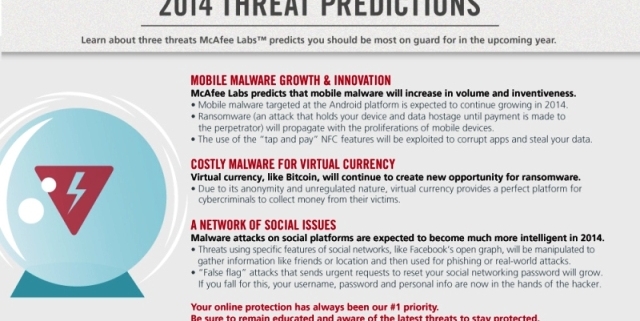McAfee Labs 2014 Predictions
As we wind down the year, it’s a time to reflect, but also to look forward. Some of us may be thinking about resolutions and what we need to do in the upcoming year—exercise more, eat better, have better work/life balance, etc. Others of us will be thinking about how we’re going to ring in the New Year.
This time of year the McAfee Labs™ team is busy looking at what the new threats are going to be and what are new trends they expect to see. Today they released their 2014 Threat Predictions, and here’s what they believe will be in store for us:
Mobile Malware
While this is not new, this category of malware is growing like wildfire and McAfee Labs sees no slow down on this in 2014. And besides continued growth in this category (mostly on the Android platform), they believe that some types of mobile attacks will become prevalent.
One of these growing attacks is ransomware targeting mobile devices. Once the cybercriminal has control of your device, they will hold your data “hostage” until you pay money (whether that’s conventional or virtual, like Bitcoin) to the perpetrator. But as with traditional ransomware, there’s no guarantee that you really will get your data back.
Other mobile tactics that will increase include exploiting the use of the Near Field Communications (NFC) feature (this lets consumers simply “tap and pay,” or make purchases using close-range wireless communications), now on many Android devices, to corrupt valid apps and steal data without being detected.
Virtual Currencies
While the growth of Bitcoin and other virtual currencies is helping promote economic activity, it also provides cybercriminals using ransomware attacks with a perfect system to collect money from their victims. Historically, payments made from ransomware have been subject to law enforcement actions via the payment processors, but since virtual currency is not regulated and anonymous, this makes it much easier for the hackers to get away with their attacks.
Attacks via Social Networking Sites
We’ve already seen the use of social networks to spread malware and phishing attacks. With the large number of users on Facebook, Twitter, Instagram and the likes, the use of these sites to deliver attacks will continue to grow.
In 2014, McAfee Labs also expects to see attacks that leverage specific features of these social networking sites, like Facebook’s open graph. These features will be exploited to find out more information about your friends, location or personal info and then be used for phishing or real-world crimes.
The other form of social attacks in 2014 will be what McAfee Labs calls “false flag” attacks. These attacks trick consumers by using an “urgent” request to reset one’s password. If you fall for this, your username and password will be stolen, paving the way for collection of your personal information and friend information by the hacker.
Here’s some security resolutions to help you stay safe online in 2014:
- Strengthen your passwords: If you’re still using easy to remember passwords that include your home address and pet’s name, it’s time to get serious about creating strong passwords that are at least eight characters long, and a combination of numbers, letters and symbols. Don’t include any personal information that can be guessed by hackers.
- Don’t open or click on suspicious emails, text or links: By simply opening an email with a piece of ransomware within it you could be leaving your devices vulnerable to hijacking.
- Be aware when downloading apps: Since apps are the main way mobile malware is spread today, make sure to do your research before downloading any app and only download from reputable app stores.
- Limit your use of NFC, Wi-Fi and Bluetooth: If your phone has NFC capabilities, you may be unaware of default settings. Turning this feature off, as well as turning off Bluetooth and Wi-Fi connections, will not only help you save battery life on your devices, but prevent attacks from hackers looking to exploit your wireless connections.
- Check your bank statements and mobile charges regularly: This way, you can discover and report any suspicious charges
- Install comprehensive security on all your devices: With the growing amount of threats that we’re seeing, you want to make sure that your all your devices (not just your PC) are protected. Consider installing security software such as McAfee LiveSafe™ service that protects your data, identity and all your devices (PCs, Macs, smartphones and tablets).
Robert Siciliano is an Online Security Expert to McAfee. He is the author of 99 Things You Wish You Knew Before Your Mobile was Hacked! Disclosures.



























